- Home
- Anne Frasier
Stay Dead (Elise Sandburg series) Page 2
Stay Dead (Elise Sandburg series) Read online
Page 2
CHAPTER 3
David helped Elise from the car. He was dressed for work in black slacks, white shirt, black tie, and black knee-length wool coat. Unlike the more casually dressed officers at the Savannah Police Department, David had been reluctant to part with his old FBI threads. Elise was a sloppy contrast in her black hoodie, black sweatpants, and black plastic walking cast. Once upright, hobbling on one foot, she understood his reaction to seeing Anastasia’s place.
Whenever Elise thought of her aunt’s house, she pictured it as it had been all those years ago, not like it was now—a Southern plantation swallowed by vegetation. Plywood over windows, dangling shutters, rotten support posts, crumbling tabby brick. Beautiful decay, a house devoured by nature.
It had never been well kept, and had always looked neglected, but that neglect had been deliberate. But the Lowcountry had a way of swallowing a place if a person wasn’t careful.
Vegetation crept out of the soil and wrapped around footings and pillars and shutters, vines climbed up past the second-story porch all the way to the gabled windows and chimney of broken brick. And yet the building itself didn’t seem to cower. Quite the opposite. Even in its crumbled, decaying state, it seemed to stand defiantly against a brilliant blue sky.
Maybe it was a Southern thing. That magnificent and ornate defiance that permeated the very buildings. A sense of place that set itself apart from the rest of the country.
“Smell that?” Elise asked.
David inhaled. “What is it?”
“Sassafras.”
She closed her eyes and took a deep breath. “I love it.” Rather than coming from one place, the scent seemed to be everywhere, with no specific source. “It’s a favorite of root doctors.”
David snorted, then asked, “Love spells?”
“You could say that. Good for treating STDs.”
He laughed a little more seriously, and then they both turned their attention back to the structure in front of them.
It wasn’t a Gone With the Wind plantation and never had been. For Anastasia, it hadn’t been about the past but about a good space for her artists’ colony. It hadn’t been about preserving history, but rather about creating her own. In its day, the plantation had been known around the country. Maybe not by the mainstream, but by struggling artists looking for a place where they could live cheaply while they honed their craft.
Elise made a sound that conveyed her dismay, and David’s hand touched her shoulder. “Let’s go back to Savannah. This isn’t habitable.”
Despite his words, he handed her the crutches and she wedged them under her armpits. “I want a closer look,” she said.
It wasn’t just that the house was in shambles. The decay also served as a painful reminder of the passage of time. The clock was ticking. It had been ticking all along; she just hadn’t been mindful of it.
“Wait here,” David said. “I’ll check it out and come back with a report.”
Elise and David were both picturing her trying to navigate whatever they would find inside. Elise imagined broken furniture. Dead rats. Piles of trash. “No, I want to see it while I’m here.” Her plans were already shifting. She already imagined camping out on David’s couch.
“How long has your aunt been gone?” David asked, surveying the house while exotic perfume continued to drift to them from unknown places, the scents comforting and at odds with the visual image.
“Two months.” Elise hadn’t even known Anastasia was dead until a week after the funeral.
“How’d she die? I don’t think you told me.”
No, she hadn’t wanted to tell him. “She drowned,” Elise said with reluctance. David’s young son had drowned.
Elise went on with the story, hoping to paint an unfamiliar picture for David in order to take him away from the scene of his own terrible tragedy. “She was a strong swimmer, but she’d been drinking.”
“Drinking and swimming never mix,” David said, taking the drowning well even though he’d flinched at the D-word, the memory of his loss shooting through his veins before he could get full control of it.
Elise could almost visualize the night of her aunt’s death. The meal around the table, along with drinking and talking and laughing. Those events were often followed by a dip in the indoor pool. But sometimes they would take lanterns and make their way to the Ogeechee River that bordered the property. When Elise was a kid, it had all seemed so magical. Looking back as an adult, she realized those late-night skinny-dips had been laden with alcohol and drugs.
She went back through her memories until she heard her aunt’s voice and the laughter of the men and women who surrounded Anastasia with what her soul craved. Admiration, love, art.
Elise regretted losing touch with her aunt over the years. Elise’s parents had cut off ties after finding out about the drinking parties and the skinny-dipping and the strange men who came and went. Elise was forbidden to have any contact with Anastasia, and as the years passed Elise almost forgot her aunt existed.
But she regretted not looking her up once she became an adult. It was so easy to let these things slide. It was the way of adults. It became easier to let it go than to restart something that couldn’t be restarted. Because those reacquaintances often didn’t move past nostalgia. Those people, once removed from your life, were hard to put back. You could try, and you could think it was going to work, and you could enjoy the company and the reminiscing, but it was hard, if not impossible, to make them a part of your life once again. And so opening that door invited in a certain bittersweet melancholy, and a reminder that life was fleeting. And those moments that seem bigger than a movie? Even those moments fade and become part of our mental scrapbooks.
“What are you thinking about?”
David was watching her with concern. Elise had witnessed that concern a lot lately.
His face was the first she’d seen after those of the recovery room nurses. Her daughter had been there, along with Elise’s ex-husband, who’d flown in from Seattle. That had surprised and touched her. But Elise’s eyes had latched onto David. Because he would understand.
These were the emotional pacts and bonds you made with partners. And when he flirted and told Elise her Southern accent was like Tupelo honey on a hot and lazy afternoon, she laughed while stashing his words away where she kept everything about him. Close to her heart, but not in her heart.
Partners couldn’t be lovers.
She wasn’t sure if that was a rule or something that simply made sense. Sometimes she thought she and David should just do it. Just go away together and spend an entire week in bed. Finally have an answer to the question they both wondered about. What would it be like? Them? Together?
Maybe it wouldn’t be so great. Maybe they’d regret it. And then they’d have to see each other every day. And work together every day. So awkward. Or worse, maybe he would leave. Go to another city. Another department. And he wouldn’t come to her house on holidays. And she wouldn’t look out the window to see him helping Audrey with her softball pitching.
Instead, he’d go into the scrapbook with people like Anastasia. People she’d let go, that she didn’t hang on to because the magic was gone. She didn’t want the magic with David to be gone. She didn’t want to lose him. She couldn’t bear that. So this . . . this . . . whatever it was that they had . . . it was okay. It wasn’t right, but it was better than losing him.
“You’re doing it again.”
“What?”
“Thinking. You get that look on your face that I haven’t seen before. What’s going on with you, Elise?”
“Too much medication.” That was probably it, she told herself. She’d hoped to cut back, but she was still popping pills like a junkie.
Up the porch steps. Not easy with crutches, but she ignored David’s outstretched hand. I can do this myself. I can take care of myself.
“The trim is blue,” he said in his investigator voice.
“Haint blue.” It kept out evil spirits. Or kept them in. “That wasn’t there when I was a kid.”
“Maybe she suffered from dementia in her later years.” David tested the doorknob. “That would explain the condition of the house and the paranoia about evil spirits.” The door swung open. Surprised, he stumbled inside.
Anastasia had never locked the doors.
Thank God the inside didn’t reflect what they’d seen outside.
“Somebody’s been taking care of this place,” David said with surprise.
The interior had kind of a gypsy-wagon or vaudevillian feel to it that hadn’t changed since Elise’s last visit. Back in the 1800s, wide wallboards had been covered with starched fabric, then coated with paint. At some point, the cloth was removed to expose rough, unfinished wood that had turned black in places. Wood you could smell. The old kind of wood that hinted of men in frock coats and women in mourning gowns.
Along the dark walls were framed and unframed paintings and drawings, given to Anastasia in return for room and board. Some of the work was hideous, but much of it was colorful, and Anastasia had loved color.
“Okay, I take back everything I said.” David stood with hands on hips, coat hanging open as he surveyed the space. “This house is cool as hell.”
“You would like it.” After all, he lived in one of the most depressing buildings in Savannah. David had a dark soul for someone who was always cracking jokes. She often wondered if the joking was a recent trait, a screen, or had he been funny before tragedy entered his life.
Even though Elise hadn’t been to the plantation since childhood, the open layout was the same, which was saying a lot considering the amount of renovations that had taken place over the years. Even much of the artwork hadn’t changed.
The first floor had been gutted and remodeled, most of the work done over time and for free by the artists who visited the plantation. To the left of the front door was a kitchen with white farmhouse cupboards, a farmhouse sink, and mosaic countertops. A strange chandelier with gold cherubs hung above a round wooden table. To the right was a narrow church window and a staircase that led to a solid blank wall—another remodel, Elise always assumed.
In the adjoining dining area was a hand-hewn table that could seat twenty people, and very often had. Walls were floor-to-ceiling bookcases, packed with hardcovers and paperbacks and more pieces of art, from sculptures to ceramic bowls thrown on a potter’s wheel. Past the staircase was an upright piano surrounded by comfortable furniture. Deep couches and chairs in dark shades of greens and reds, the colors echoed in lampshades. One large section of the shelves was dedicated to a stereo and what had to be at least a hundred record albums. And there, near the stereo, was the infamous cuckoo clock.
Elise pulled the chain, raising the pinecone weight, then she tapped a finger lightly against the leaf-shaped pendulum and the ticking began. She turned to David with a smile. “Still works.”
Beyond the sitting area were large windows that overlooked the outdoors. Through the windows, Elise could see the stone path that led to the Ogeechee River, and the dock where the drunken parties had been known to end in skinny-dipping. Beyond that was a small island with a cabin where Anastasia had taken her on picnics.
“Someone must have aired the place out,” Elise said. Not only aired it out, but left a bouquet of flowers in the center of the round kitchen table. Along with the flowers was a note from Melinda, Anastasia’s daughter.
“She says she put clean sheets on the bed in the main room, and milk and fruit in the refrigerator.” Elise returned the sheet of paper to the table. “That’s nice.”
David inhaled. “I smell chlorine.”
The pool. Where Anastasia’s body was found.
“It’s this way.” Elise hobbled in the direction of the chlorine. “You stay here.” She moved toward the glass door that led to the enclosed room, opened the door, and stepped inside.
As with most childhood memories, the pool was smaller than she remembered, but one end was deep enough for a low diving board. Her aunt would swim laps in her rubber cap with pink flowers, pausing to hold up her arms to her niece.
“Jump, Elise. Come on. I’ll catch you.” Red lips. White teeth. A beauty and charm Elise couldn’t resist, that no one could resist. “Come on, Elise. I’ll teach you how to float. Better than that, I’ll teach you how to sink. I’ll teach you how to let the air out of your lungs so you can sink to the bottom of the pool. It’s magic down there. Down there is the land of tea parties. Of mermaids and castles of the deep, and fish that glow in the dark.”
“They must have drained and refilled it,” David said from behind her.
“You shouldn’t be here,” Elise told him. She didn’t want him driving back to his apartment full of thoughts of his son. She didn’t want him reaching into the cupboard for oblivion once he got home.
“I’m okay.”
The water was crystal clear. They were both relieved to find that it no longer gave off the aura of death. In one corner of the room was a white chaise longue with a black swimsuit draped over it. The swimsuit looked like the one Elise’s aunt had worn all those years ago. And Elise suddenly got the feeling that Anastasia had never died, that she was still there, that maybe she’d just stepped out for groceries and soon she would be back with wine and bread and the makings of salad and lasagna.
When Anastasia was around, Elise had felt challenged to be a better Elise, and she was pretty sure other people felt that way too. Strangers wandered in from the road after having hitchhiked across the country, carrying a suitcase or a duffel bag, many with guitars. They’d heard of her. They’d heard of Anastasia and the plantation.
“Artists need help,” Aunt Anastasia had said. “Artists have to stick together. Are you going to be an artist or a drone?” she’d asked Elise.
“What’s a drone?”
“A drone is someone who does whatever she’s told. A drone doesn’t think for herself. Being a drone isn’t a bad thing. The world needs drones.”
But Elise had the feeling being a drone was a bad thing. This was a test. “I want to be an artist.”
Anastasia smiled at Elise, and Elise jumped into her arms.
“Did you have an adult who was a major influence in your life?” Elise asked David as they both stared at the pool.
“You.”
“No, not me.”
“Yeah, you.”
“As a kid.”
“My mother.”
He and his mother were close. Elise liked that about him.
“My aunt was the only person who accepted me for who I was,” Elise said. “She was the only person who wasn’t afraid of where I’d come from.”
“See, I think that’s what this is all about. You had a near-death experience. That makes people reevaluate their lives. I get that. But the thing to keep in mind is that sometimes it makes us behave in uncharacteristic ways that don’t make a lot of sense.”
“Like this,” Elise said. “Like coming here. Now.”
“Like this,” he agreed. “I’ve been where you are now. I know how it messes with your head.”
“The plantation has been handed to me. It came when I most needed it, and you shouldn’t ignore something like that. So what if it’s irrational and out of character? What difference does it make? I’m a big girl. So I spend a week or two here and when I’m ready to go back to my place I go back.”
“You’ll go stir crazy.”
“You don’t know that.”
He shook his head, resigned. “I’ll get your suitcase.”
Down the hall from the kitchen were three bedrooms. The wooden floor creaked, and walls were bare to the laths and decorated with more framed art. At the end of the hall was a narrow door that took a person to the cramped servant stairs and the
second and third level.
If things were still as Elise remembered, the second floor would look like a boarding house, with six rooms on each side of a narrow hallway. A couple of the rooms had been used as art studios back in the day, and Elise recalled walking in on a painting session for which her aunt was the model, lying in a pool of sunlight, completely naked. Nudity was an unheard of occurrence in Elise’s house. She’d gasped, and Anastasia had gracefully lifted a hand in languid greeting.
Now many of the windows were broken and boarded up, and Elise couldn’t help but wonder if the couch where Anastasia had reclined was still there. And the painting? What happened to the painting?
Beyond the studio, another flight of stairs led to a third story of mice and dust and planked flooring—an area of the house where Elise had been forbidden to go.
“Are you sure you want to stay in this room?” David asked, hefting her plaid bag onto a padded vanity stool.
“It’s fine.” Elise surveyed the space. Windows that overlooked dense trees, a sprawling king-size bed. More artwork on the walls. She remembered being read to in this room, cuddling up next to her aunt, and Anastasia’s two dogs at the foot of the bed.
“This will be the handiest,” Elise said. “It has a bathroom, and the kitchen is just down the hall.” She pointed. “Phone next to the bed.”
“So, no talking you out of this.” David stuck his hands deep in the pockets of his coat.
They both knew that wasn’t going to happen.
And then he did something very strange and very uncharacteristic. He approached Elise in a way he’d never approached her before. With serious blue eyes that transmitted more than friendship. Eyes that held a question she didn’t want him to ask. He reached for her in this tender way, a way that seemed to project and evoke longing.
There it was. The thing between them. Elise’s breath caught as she thought about how it would feel. His lips on hers. And more than a kiss. Much more. What would it hurt? What would it hurt to drop the screen of friendship?
David was old-world handsome. Classically handsome. She didn’t hold that against him, because it came in handy when they interviewed women, and sometimes men. Dark, straight hair with streaks of light brown that would vanish whenever he got a haircut, then reappear as the sun did its work. Beautiful skin, and an angular jaw that needed to be shaved again by late afternoon. Like now. And a mouth . . .

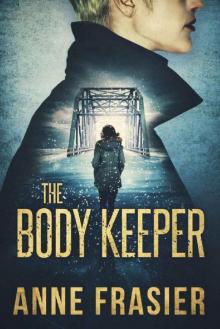 The Body Keeper
The Body Keeper Hush
Hush Play Dead
Play Dead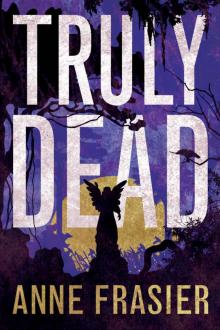 Truly Dead
Truly Dead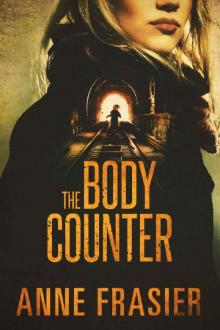 The Body Counter
The Body Counter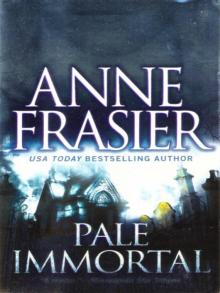 Pale Immortal
Pale Immortal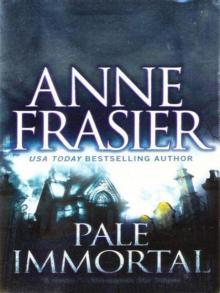 (2006) Pale Immortal
(2006) Pale Immortal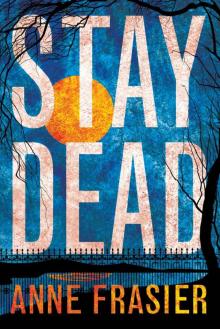 Stay Dead (Elise Sandburg series)
Stay Dead (Elise Sandburg series) Sleep Tight
Sleep Tight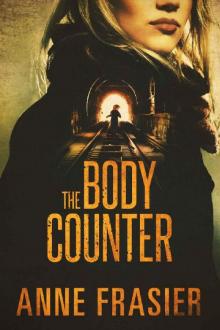 The Body Counter (Detective Jude Fontaine Mysteries Book 2)
The Body Counter (Detective Jude Fontaine Mysteries Book 2)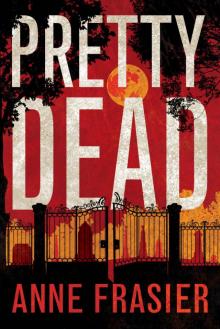 Pretty Dead
Pretty Dead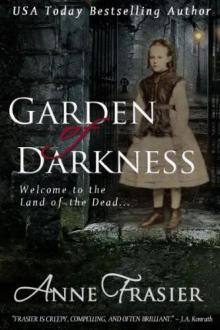 Garden of Darkness
Garden of Darkness